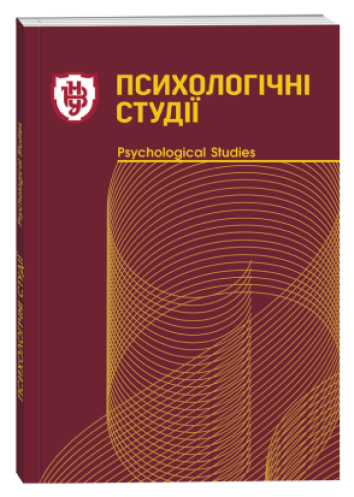PSYCHOLOGICAL PECULIARITIES OF STRESS RESISTANCE OF POLICEMAN PERSONALITY UNDER CONDITIONS OF MARTIAL STATE
DOI:
https://doi.org/10.32782/psych.studies/2023.1.5Keywords:
stress resistance, policeman personality, stress, martial law.Abstract
The article is devoted to the study of psychological peculiarities of stress resistance of policeman personality under conditions of martial state. Theoretical analysis and systematization of scientific sources made it possible to confirm the following: professional activity of police employees is characterized by significant negative emotional saturation and has a risky nature, especially under conditions of martial state, therefore the study of the issue of stress resistance of policemen is extremely urgent problem today. Surely, the skills of effective countermeasures against the negative impact of stress factors provide a policeman with successful adaptation to environmental conditions, allow to maintain high work capacity and achieve successful self-realization in order to preserve mental health. Domestic researchers indicate the importance of finding internal and external personality resources that contribute to the development of stress resistance of an individual. We used a number of psychodiagnostic methods: the Freiburg personality questionnaire (FPI) and "Tendency to stress" method (modified by M. Friedman and S. Rosenman) to achieve the goal of the research. The empirical study results proved that majority of policemen have low level of neuroticism, irritability, and susceptibility to stress, that is, they are characterized by high level of balance, stress resistance, which provides the ability to self-regulate, manage one's own mental states and overcome life's difficulties, etc. Only one subject was diagnosed with the high level of neuroticism and irritability indicators, low level of stress resistance and activity indicators, predominance of negative emotions, which may testify about manifestations of post-traumatic stress disorder, which confirms in work capacity and activity decrease, perception of the surrounding world as threatening, full of obstacles and difficulties, etc.
References
Бардин Н., Жидецький Ю., Когут Я., Пряхіна Н., Ясінський В. Стрес та стресостійкість в діяльності працівників правоохоронних органів: Навчально-методичний посібник. Львів. 2020. 119 с.
Гуменюк Л. Й., Сулятицький І. В. Психологія професійної діяльності працівників органів внутрішніх справ: навчальний посібник. Львів: ЛьвДУВС, 2011. 648 с.
Кісіль З. Р., Кісіль Р.-В. В., Перепелиця А. В. Особливості синдрому емоційного вигорання у працівників Національної поліції України. Науковий вісник Львівського державного університету внутрішніх справ. Серія психологічна. Вип. 2. 2018. С. 57-71.
Кісіль З. Р., Кісіль Р.-В. В. Психоемоційна напруженість як детермінанта професійної деформації працівників Національної поліції України. Соціально-правові студії. 2021. № 3 (13). С. 177–188.
Лазос Г. П. Резильєнтність: концептуалізація понять, огляд сучасних досліджень. Актуальні проблеми психології. Т. 3. Київ, 2018. Вип. 14. С. 26–64.
Микитюк М., Дучимінська Т. Стресостійкість як чинник збереження психічного здоров’я працівників поліції в сучасних умовах. Психологічні основи здоровя, освіти, науки та самореалізації особистості: матеріали ХV Міжнародної науково-практичної конференції (м. Луцьк, 23-24 березня 2023 року). Луцьк: Вежа-Друк, 2023. С. 153-156.
Пономаренко Я.С. Поліція в умовах війни: професійні стресові фактори. Особистість, Суспільство, Війна. Харків, 2022 С. 95-97
Шпак М.М. Стресостійкість особистості в дискурсі сучасних психологічних досліджень. Психологія особистості. 2022 Вип. 39. ст. 200 http://habitus.od.ua/journals/2022/39-2022/36. pdf
Carron, А.V., Morford W.R. Anxiety, Stress and Motor Learning. Perceptual and Motor Skills, 27(2), 507–511.
Schоnfeld, Р. The effects of daily stress on positive and negative mental health: Mediation through self-efficacy. International Journal of Clinical and Health Psychology, 16(1), 1–10.
Wersebe, Н. The link between stress, well-being, and psychological flexibility during an Acceptance and Commitment Therapy self-help intervention. International Journal of Clinical and Health Psychology, 18(1), 60–68.







